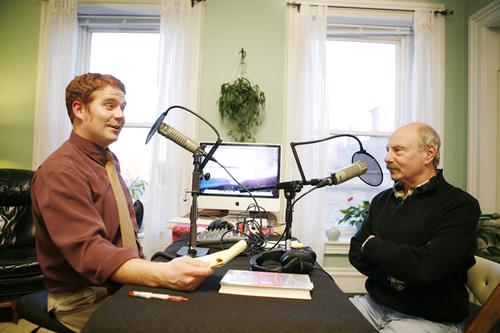Podcasting relationships are like any other: they fade in time. For four years, James Howard Kunstler and Duncan Crary co-hosted the KunstlerCast: A Tragic Comedy of Suburban Sprawl. Each episode functioned as a mile marker in an extended interview between the sixty-something Kunstler, best known as the author of The Long Emergency and The Geography of Nowhere and the thirty-something Crary, a former newspaper reporter.

Duncan Crary (Left) and James Howard Kunstler (Right) Photo by Cal Crary
This May-December marriage of sorts is forged necessity and mutual belief structures and affinity and proximity to Upstate New York, and the greater rustbelt region. Crary handled the production and served as play-by-play man to Kunstler’s color commentary. The KunstlerCast was part travelogue of an ironic globetrotter in Kunstler, and part episodic update on how the world conforms to Kunstler’s polemic.
Week by week the duo weaved the tale of a wary world on the brink of tragedy. The given that drives every episode is that fossil fuel is a finite resource that has peaked. Kunstler believes this peak, commonly known as Peak Oil marks the end of suburban sprawl and life as we know it. On the horizon they described, a troubled more malleable world scaled to the size of small American cities within America’s existing crumbling infrastructure. In anticipation, Kunstler and Crary advocated for filling in the missing teeth of these cities in terms of community and architecture. This description only touches the surface of Kunstler and Crary’s simultaneously cynical and cheerful narrative.
In the summer of 2012, 214 meticulously crafted episodes later, the duo ceased production with the promise of more content to come. Much like the famed defunct hip-hop duo Outkast, Kunstler and Crary’s contrasting styles merged into a unique concoction of dramedy, only to peel apart into two dueling complimentary parts.
Crary’s spinoff of sorts A Small American City podcast emerged in late December 2012. Free from direct analysis of Kunstler’s polemic, Crary has managed to narrow his scope and broaden its focus. The KunstlerCast hinged on its titular character’s point of view and many details of his story.
A Small American City exists in the vein of This American Life, an anthology of stories of resurgence in Crary’s corner of the rustbelt. City’s stories are centered on his beloved adopted hometown of Troy, New York. Troy is nestled in the shadow of Albany, New York. A favorite among these episodes is The Night Jack Quit Drinking. In Drinking, bohemian novelist Jack Casey describes how battle with booze, led him to go to law school and eventually become a New York State Parliamentarian. A Small American City episodes are sporadic, only 8 have been released since its premiere.
Within a month of Crary’s launch the KunstlerCast reemerged as an interview driven show. It’s a rarely seen side of Jim Kunstler. The pundit has gone from color commentator on the collapse of modern civilization to Keith Olbermann/Bill O’Reilly style partisan anchor on the same. Kunstler’s version of the partisan anchor removes the veneer of news style and favors a personal tone. Kunstler skews more liberal in broader cultural issues and traditionally conservative on local views including strict regulations on building codes.
In presentation the new format is one-dimensional but unlike the original, Jim is in the driver’s seat. Every guest reinforces Kunstler’s narrative whether it’s online Peak Oil darlings Nicole Foss of The Automatic Earth and Five Stages of Collapse author Dmitry Orlov with Northeastern hyper-local efforts like the Vermont Sail Freight project which is designed to transporting Vermont’s crops across the Northeast by sailboat sprinkled in between. Kunstler is preaching to the choir and knows it. The KunstlerCast is released each Thursday.
Unlike Crary’s City, Kunstler’s choice is light on production. Kunstler’s learning curve in the area is steep. Poor audio distracts from the interviews. This hindrance has hampered the once ambitious KunstlerCast. Kunstler has acknowledged these issues on several episodes and admits it’s a work in progress.
What’s lost in both incarnations is what made the original recipe great: the endless chemistry between Kunstler and Crary. Whether either can reach that plateau alone is unknowable. The strength of both spinoffs is their mutual acknowledgement that what was has run its course and shouldn’t be replaced with a pale imitation like a post Adam Carolla Loveline. Instead, Crary and Kunstler took the tact of great spinoffs like Frasier or Mork and Mindy. Each show mined successful underdeveloped elements of the original concept and filled in the missing teeth. Perhaps our cities will do the same.